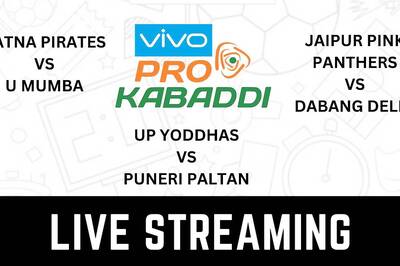
views
To ally or not to ally, that is the question. Rahul Gandhi, the prince of indecision, is not sure whether to make friends with frenemies.
Waffling is never a good idea, because potential allies may decide to go it alone and if they don't, 11th-hour alliances are a recipe for chaos.
Arvind Kejriwal offered Gandhi a friendly handshake months ago, only to be left hanging. Haunted by the ghosts of past alliances and fearful of being cannibalised, the Congress is keeping Kejriwal in suspense.
On the one hand, the Aam Aadmi Party (AAP)’s need for an alliance is greater than that of the Congress.
And once the Congress vote is transferred to the AAP, it will be hard to win it back. On the other hand, Kejriwal’s tactical emotional blackmail makes Gandhi look bad to the rest of the opposition.
As a short-term strategy, where beating the BJP is the sole agenda, an AAP-Congress alliance makes sense. In the long term, if reviving the Congress is the main agenda, it may not. Last heard, Rahul was still mulling it over.
Before the 2018 assembly polls in Madhya Pradesh, Chhattisgarh and Rajasthan, Mayawati had mooted a “respectable” alliance with the Congress. The grand old party's anaemic response annoyed the BSP supremo, who told the “arrogant” Congress to take a hike.
She followed it up by leaving the Congress out in the cold in Uttar Pradesh and everywhere else. Now, Samajwadi Party chief Akhilesh Yadav, whatever his personal equation with the Gandhi scion, had no choice but to follow Mayawati’s lead.
Some may argue that Rahul should have been more pro-active in wooing or accommodating allies, but his dilemma is understandable.
When West Bengal chief minister Mamata Bannerjee hosted opposition parties as a platform for a proposed grand alliance, all the invitees bonded over an orgy of BJP-bashing. But the flirtations proved to be short-lived and “ekla chalo re” became the order of the day.
While everyone was caught up in the anti-BJP rhetoric, no party was willing to sacrifice self-interest to serve the larger cause. Why, then, should the Congress?
Down south, the Telugu Desam Party (TDP) and Congress divorced on grounds of mutual incompatibility. (The Andhra Pradesh situation is exemplified by the situation in Araku, where erstwhile UPA minister-turned-TDP nominee Kishore Chandra Deo is being challenged by his daughter, a Congresswoman, to the benefit of the YSR Congress.)
In Assam, the Congress is still chewing over an alliance with the All India United Democratic Front (AIUDF). Perhaps it smells a rat in the perfume baron Badraudddin Ajmal's offer and fears it would be playing into the BJP's hands.
In a hastily concluded poll-eve alliance, many hopefuls of both parties may refuse to stand down and insist on contesting as independents. Party workers, asked to put the brakes on their campaign and work for the alliance partner, may prefer to sit at home.
Voters, confused by the whole drama, may be unsure of which button to press.
The first mahagathbandhan bloomer goes all the way back to 2016. Nitish Kumar, the poster boy of the grand alliance, was described by Lalu Yadav as “the next Prime Minister” and by Sitaram Yechury as the leader of the “non-Congress opposition”.
Nitish was the first to broach the idea of a national-level mahagathbandhan against the BJP with the Congress. Unwilling or unable to scotch the crisis in Bihar, the Congress fiddled while Nitish burnt his boats with the opposition.
The silver lining is that the grand old party's ‘legacy’ relationships — ties forged before Gandhi became party president — have endured.
The Nationalist Congress Party (NCP), Rashtriya Janata Dal (RJD), Dravida Munnetra Kazhagam (DMK), Jharkhand Mukti Morcha (JMM) and Janata Dal-Secular (JD-S) are still on board, albeit only in their respective states.
Even in these states, squabbles over seat-sharing have strained the Congress relationship with the allies.
The RJD threw a grand tantrum and boycotted the alliance in Jharkhand, while the JD(S) accused the Congress of “back-stabbing” its nominees. The Left and Congress, too, fell out over seat-sharing.
If Gandhi’s pot of political gold lies at the end of a rainbow alliance, some colours are missing from the spectrum. A last-minute attempt to fill in the gaps will only confuse the rank-and-file, as it did in the 2017 UP elections.
(Author is a senior journalist. Views are personal)




















Comments
0 comment